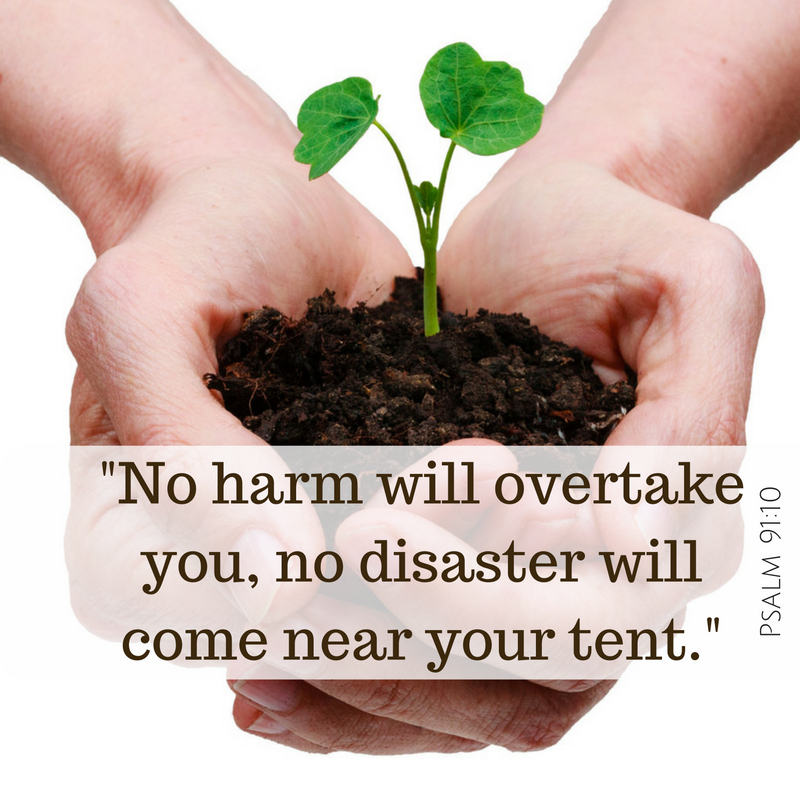Does God guarantee protection from harm? Guest writer Jeff Forrey — and former counselor at BCC — looks at Psalm 91’s claim, “no harm will overtake you, no disaster will come near your tent.” He helps Christians understand this psalm, especially those who’ve who’ve experienced a tragedy, such as an unexpected divorce or death in the family. Jeff’s article appeared first here on Biblical Counseling Coalition website and is used with permission.

For those who have recently experienced a significant tragedy, reading Psalm 91 is like being given the blade of a double-edged sword. In it we read:
2 I will say of the Lord, “He is my refuge and my fortress,
my God, in whom I trust.”
3 Surely he will save you
from the fowler’s snare
and from the deadly pestilence.
4 He will cover you with his feathers,
and under his wings you will find refuge;
his faithfulness will be your shield and rampart.
5 You will not fear the terror of night,
nor the arrow that flies by day,
6 nor the pestilence that stalks in the darkness,
nor the plague that destroys at midday.9 If you say, “The Lord is my refuge,”
and you make the Most High your dwelling,
10 no harm will overtake you,
no disaster will come near your tent.
11 For he will command his angels concerning you
to guard you in all your ways;
12 they will lift you up in their hands,
so that you will not strike your foot against a stone.
13 You will tread on the lion and the cobra;
you will trample the great lion and the serpent.
Do You Sense Comfort?
On the one hand, the images in verses 3–6 are surely supposed to be comforting: God is our protector! He preserves our lives from traps and deadly diseases and attacks. He can be compared to a huge, impenetrable fortress; no one can break down its walls to snatch us.
Verse 11 adds that one way he can protect us is by sending powerful angels to guard us. So confident is the psalmist of God’s protection that he writes a surprising claim: “You will tread on the lion and the cobra; you will trample the great lion and the serpent.”
On the other hand, these claims about God’s protection seem overstated.
We do get sick—sometimes horribly so, with cancers, heart failure, double pneumonia, and so on. People do hurt us—sometimes in terribly cruel ways: adultery and then divorce, spiteful slander, child abuse, and so on.
It makes one wonder:
How could the psalmist write in what seems like such a glib manner about life in a fallen world?
As we read through the Book of Psalms, there is plenty of evidence that the psalmists were well acquainted with the struggles of life. They do cry out to God because of being attacked, mocked, abandoned, and infected (for example, Psalms 6; 13; 88; 102).
These other psalms—called lament psalms—are regular reminders that even the people of God can be treated harshly and suffer greatly. The lament psalms provoke a different reaction from us: How long will you let this go on Lord?
Since both perspectives—God can protect us from difficult trials and God might allow difficult trials in our lives—are found in the Book of Psalms, we must assume that both are important for understanding our trials and our relationship to him. We will the second of these possibilities in this post and the first in the next post.
God Will Allow Difficult Trials in Our Lives
Living in a fallen world will regularly disturb our comfort and security. We can expect someone at some time will disappoint or insult or try to take advantage of us. We can expect that at some time some infections will overwhelm our bodies’ defenses.
Additionally, flat tires, drunken drivers, kidney stones, thieves, migraines, and bullies are all possible in a world burden by the curse on creation. The apostle Paul reflected on how great this burden is when he wrote about how our groaning is part of a much larger “choir” as all creation groans in anticipation of being liberated from the curse (Romans 8:19–21).
But, it is also vital that we understand that God hears those groans—and he has responded to them. He has set in motion a plan to redeem his people and to liberate his creation from the burden of the fall. Through the death and resurrection of Jesus, God has confirmed his intention to eliminate all of the effects of the fall—diseases, sin, pain, and ultimately death.
God’s Plan Has a Timetable
God’s plan also has a timetable; God’s plan of redemption is unfolding in stages. Therefore, while we do experience the devastating effects of sin and suffering at various times in our lives, we are also assured that we are destined for something far greater in God’s plan and that even our times of suffering can be used for God’s good purposes now (for example, see 1 Peter 1:3–9).
God is not ignorant of nor is he ignoring our present suffering. He will use our suffering in unexpected ways when we put our trust in his plan (Psalm 91:2). Paul was thrilled by this prospect:
Now if we are children, then we are heirs—heirs of God and co-heirs with Christ, if indeed we share in his sufferings in order that we may also share in his glory. I consider that our present sufferings are not worth comparing with the glory that will be revealed in us. (Romans 8:17–18)
Even still, God’s grace extends even further. In my next post I will return to the theme of Psalm 91: God’s glorious protection from some of the trials that are common in a fallen world.












